No Results Found
The page you requested could not be found. Try refining your search, or use the navigation above to locate the post.
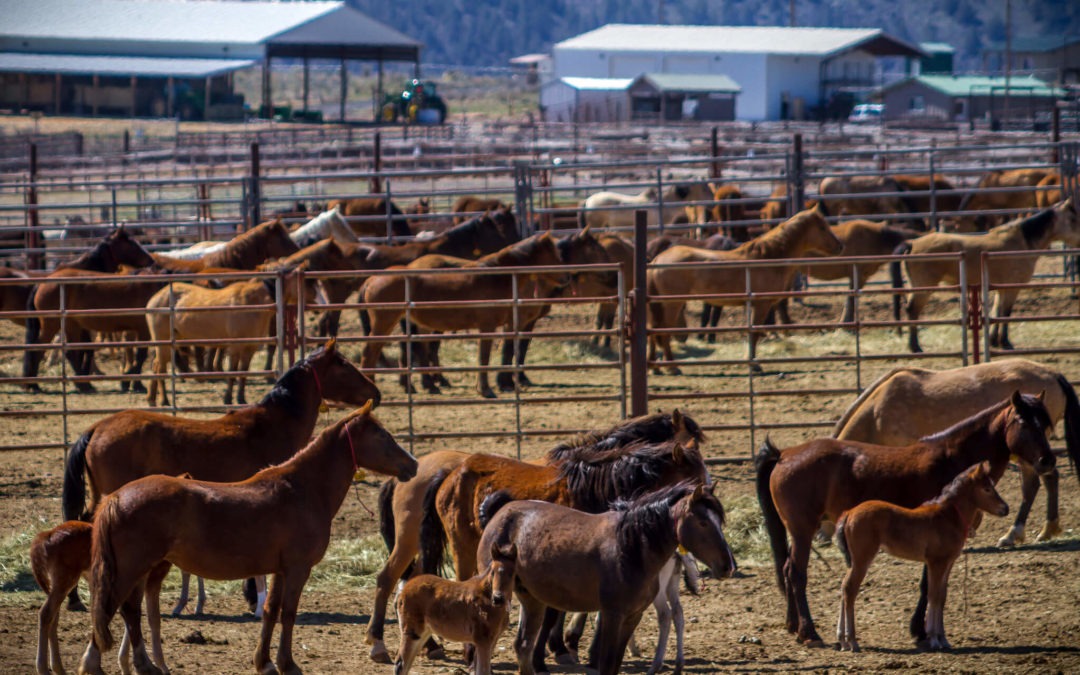
Picture: Bureau of Land Management Oregon
Excerpts from an article by Sam Block from https://newfoodeconomy.org
“Equine slaughter has been banned in America for over a decade. But the horse meat trade is still thriving.”
“For decades, BLM has rounded up wild horses and burros, aiming to do it every three to five years. Right now, a round-up is underway in Nevada. Last year, the bureau removed 11,472 wild horses and burros nationwide, more than in the three previous years combined. But its taxpayer-funded corrals and pastures, where horses wait to be sold or adopted, are nearing capacity.
The pressing question is where to put this growing population once existing options are full. Slaughtering horses for food is illegal in the U.S., but a market exists beyond our borders, in Europe, Japan and Russia. This is why brokers called “kill buyers” send trailers full of horses, both wild and domestic, into Mexico and Canada, where slaughter is legal. Last year, 81,573 horses made the trip.
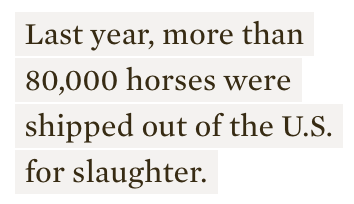
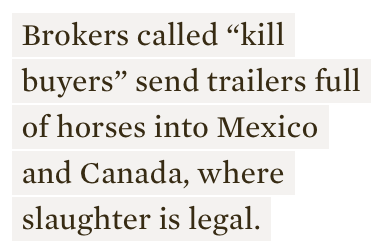
Wild horses are a minority in the disposable horse population, though they have an impact out of proportion to their numbers: They make it more difficult for ranchers to raise the cattle we eat. Once shipped out of the U.S., they are outnumbered at foreign slaughterhouses by privately-owned riding horses or racehorses sold for an array of reasons—too old, too small for a growing rider, too expensive, not fast enough, or excessive in some way that an owner found intolerable.”


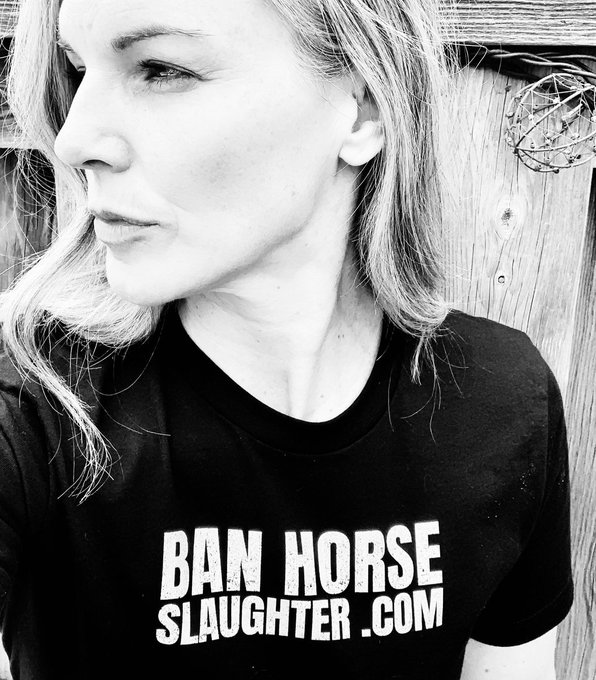
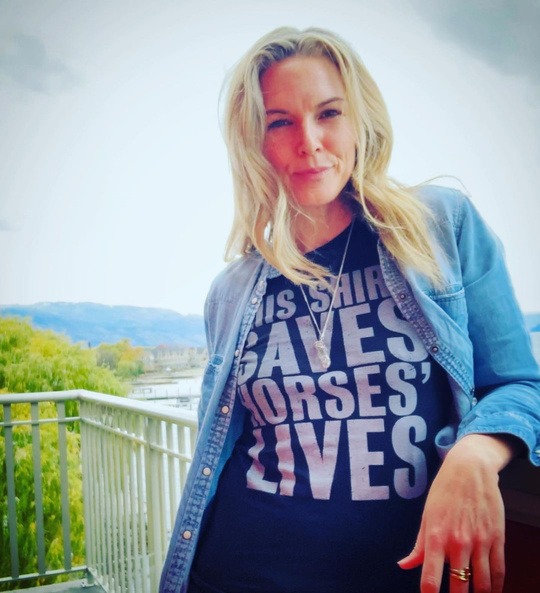
The page you requested could not be found. Try refining your search, or use the navigation above to locate the post.
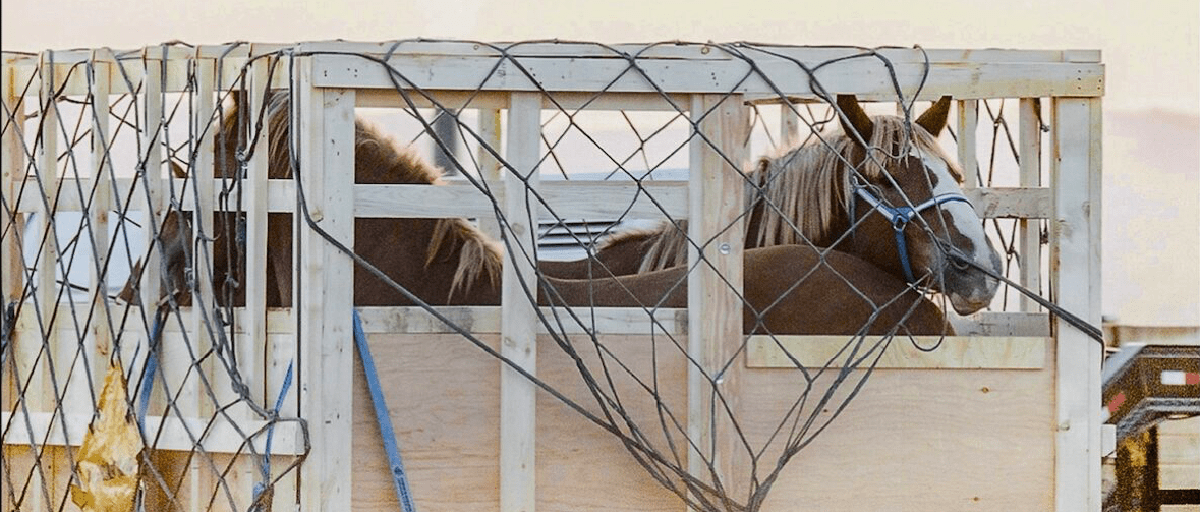
The Honourable Lawrence MacAulay, the current Minister of Agriculture and Agri-Food, has the power to end the inhumane export of horses by air for slaughter by enacting a regulatory amendment.
Help spread the word by sharing this email campaign with friends and family! You can also support the cause by donating—your contribution will help fund advertising efforts to raise awareness and push for change. Every action makes a difference!
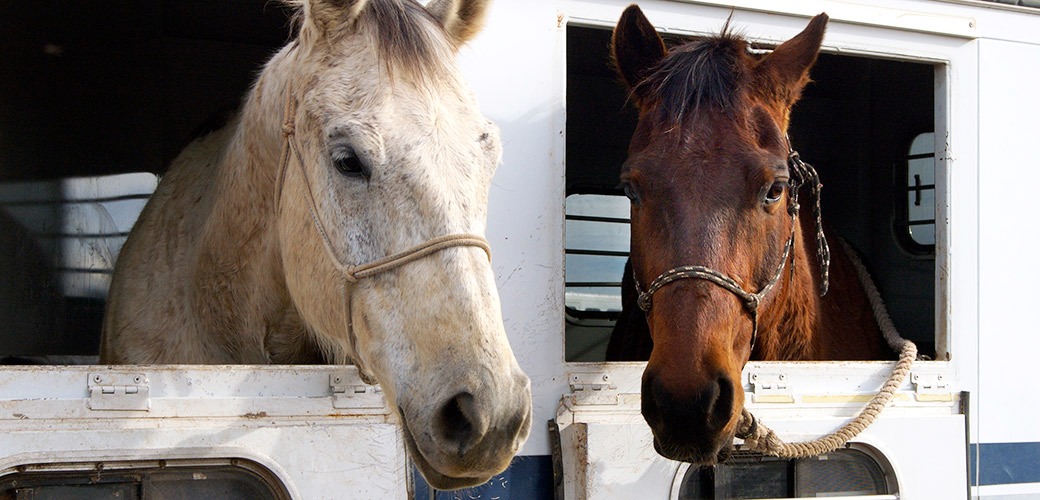
Last year, approximately 80,000 American horses were trucked over our borders (to Canada and Mexico) to be slaughtered for human consumption. Until this practice is banned and Congress passes a law against slaughter here in the U.S., no horse is safe.
The methods used to kill horses rarely result in quick, painless deaths for these animals
and sometimes they even remain conscious during dismemberment.
Horse Slaughter in the United States
The last three U.S. slaughterhouses—two in Texas and one in Illinois, all foreign-owned—were shuttered in 2007. In 2006, these facilities killed and processed more than 104,000 horses for human consumption, shipping the meat overseas.
Slaughterhouses are not clean or green enterprises and these facilities have proved to be environmentally damaging as well as economically draining to the communities that have housed them. It is clear that states with experience hosting horse slaughter facilities do not want them back: Texas and Illinois have implemented laws that specifically ban selling, giving and possessing horse meat intended for human consumption.
Horse Slaughter Abroad
Looking at data from 2012 to 2016, an average of 137,000 American horses were trucked over our borders each year to slaughter facilities in Mexico and Canada. In 2017, that number dipped to just under 80,000. Reopening slaughterhouses in America is not the answer to ending this form of cruelty.
In fact, even when horse slaughter facilities operated in the United States, tens of thousands of American horses were still exported to other countries for slaughter.
Additionally, long-distance transport is an inherent aspect of this industry. Given the vast geography of the U.S., any transport of American horses to slaughter—within or outside the U.S.—will be long and brutal.
The Future
Until a ban is in place, every American horse is at risk of meeting this fate. Fortunately, in January 2019 the Safeguard American Food Exports (SAFE) Act (H.R. 961) was introduced in the U.S. House of Representatives. The bill would prohibit the slaughter of horses for human consumption in the United States and ban their export abroad for that purpose—but we need your help to ensure Congress passes this important legislation.
This story is definitely re-post worthy. This story is a reminder to all of us in Canada who live within a days drive of where slaughter plants are in Alberta, or Quebec, about how easy it would be for any of our horses to be snatched and slaughtered before we even...
"They were family". Woman horrified to learn 2 horses were stolen and sold to be slaughtered for human consumption.Read the full story at CTVKathy O’Reilly says she still feels numb after learning from RCMP Monday that her two beloved horses — reported missing over...
This blog post is worthy of a re-post. You may also be interested in Happy Canada (Slaughters Horses) Day as well.Why aren't Canadian food inspectors surprised there's horse meat in YOUR sausages? Beware, summer BBQ-ers: there could be horse meat in your pork...



The page you requested could not be found. Try refining your search, or use the navigation above to locate the post.

The Honourable Lawrence MacAulay, the current Minister of Agriculture and Agri-Food, has the power to end the inhumane export of horses by air for slaughter by enacting a regulatory amendment.
Help spread the word by sharing this email campaign with friends and family! You can also support the cause by donating—your contribution will help fund advertising efforts to raise awareness and push for change. Every action makes a difference!
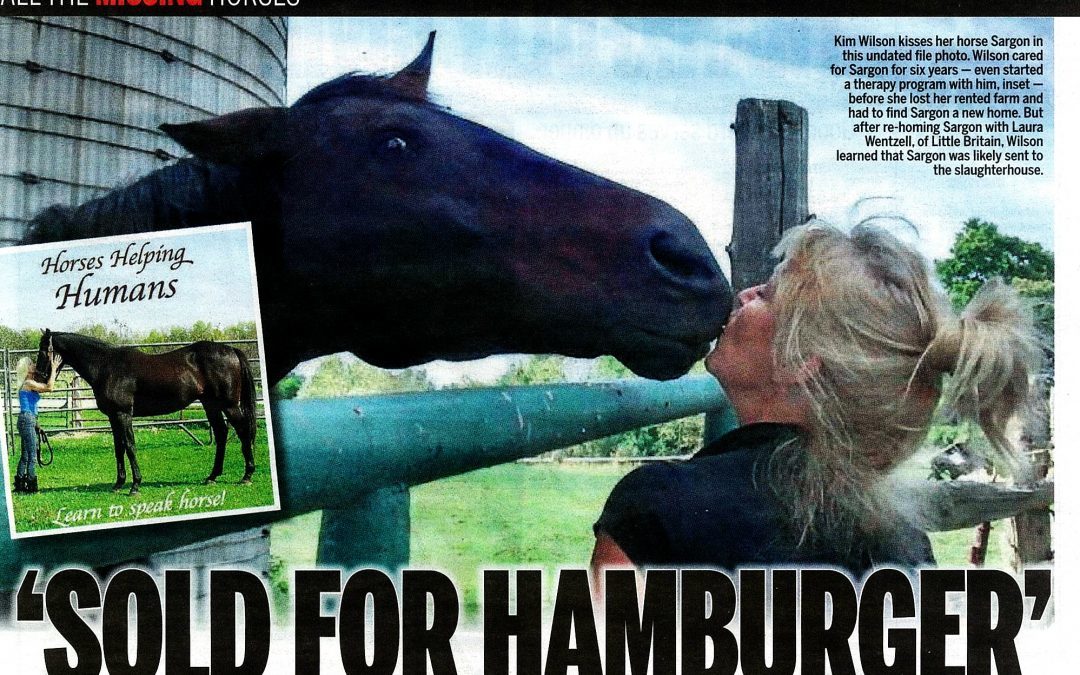
This story is definitely re-post worthy.
This story is a reminder to all of us in Canada who live within a days drive of where slaughter plants are in Alberta, or Quebec, about how easy it would be for any of our horses to be snatched and slaughtered before we even knew they were missing.
Think about how far you live from either Alberta or Quebec, a days drive, 2 days drive or less?
So this story is pertinent to those who live ANY where in Canada, but especially in the provinces of Alberta and Quebec and neighbouring provinces, like British Columbia and Ontario.
Every horse owner within Canada or the United States needs to be aware that any horse can be stolen and unless your horse is branded, there are not protocols in place at Canadian slaughter plants, to double check that a horse is stolen.
There are also not any mandatory hold times after a horse is sold to a slaughter plant so horses are often slaughtered the same day they arrive at a slaughter plant.
In other words, many Canadians could come home from work, or wake up in the morning to find that a horse or horses are missing, and our horses could be slaughtered for human consumption without us being notified first.
Slaughtering horses in Canada is legal.
The practice has been banned in the United States but horses from the United States are routinely shipped to Canada and Mexico to be slaughtered.
There have been other well documented cases of horses disappearing and being slaughtered.
Listen to Kim and Sargon’s story on Blue Sky Radio.
So what can you do to help bring this barbaric practice to a halt?




The page you requested could not be found. Try refining your search, or use the navigation above to locate the post.

The Honourable Lawrence MacAulay, the current Minister of Agriculture and Agri-Food, has the power to end the inhumane export of horses by air for slaughter by enacting a regulatory amendment.
Help spread the word by sharing this email campaign with friends and family! You can also support the cause by donating—your contribution will help fund advertising efforts to raise awareness and push for change. Every action makes a difference!
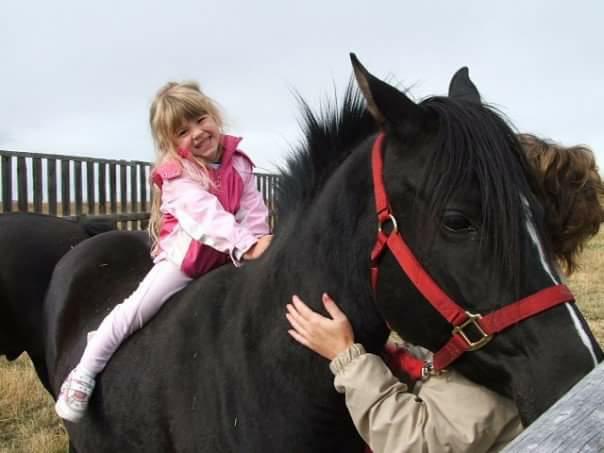
“They were family”. Woman horrified to learn 2 horses were stolen and sold to be slaughtered for human consumption.
Read the full story at CTV
Kathy O’Reilly says she still feels numb after learning from RCMP Monday that her two beloved horses — reported missing over the weekend — were stolen, shipped to a nearby slaughterhouse and slaughtered for human consumption.
Read the full story in the Calgary Herald.
PLEASE NOTE: Slaughtering horses for human consumption is no longer legal within the United States but horses from the United States are routinely shipped to Canada and to Mexico to be slaughtered for that purpose.
Some of the horse meat is consumed in Canada and much of it is shipped to other markets including the European Union, Japan, South Korea and China.
Unless your horse has an easily visible brand there is NO requirement on the part of the slaughter houses in Canada to double check that a horse that is being sold to them, does indeed legally belong to the person selling them the horse.
In addition there is NOT a mandatory hold time after a horse has been sold to a slaughter plant so horses are often slaughtered the same day they arrive at the plant.
In other words, there are those whose horses have been slaughtered before they even realize that their horses have been stolen.
Many Canadians live within an easy drive of a slaughter plant in Alberta or Quebec, and could easily wake up to realize that their horse, or horses are missing, or come home from a long day at work, and by the time they realize that their horse has been stolen, their horse or horses could already be slaughtered.
As you peruse other Blog posts on this site, you’ll learn this is NOT an isolated case.



The page you requested could not be found. Try refining your search, or use the navigation above to locate the post.

The Honourable Lawrence MacAulay, the current Minister of Agriculture and Agri-Food, has the power to end the inhumane export of horses by air for slaughter by enacting a regulatory amendment.
Help spread the word by sharing this email campaign with friends and family! You can also support the cause by donating—your contribution will help fund advertising efforts to raise awareness and push for change. Every action makes a difference!
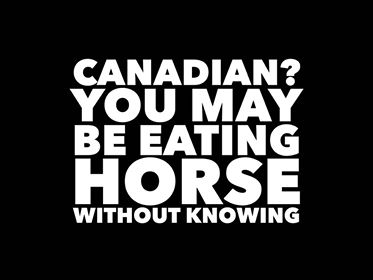
This blog post is worthy of a re-post. You may also be interested in Happy Canada (Slaughters Horses) Day as well.
Beware, summer BBQ-ers: there could be horse meat in your pork sausage. Or pork in your beef sausage. Or beef in your chicken sausage. Or chicken (and only chicken) in your turkey sausage.
Those are some of the examples cited in a new study from researchers at the University of Guelph, which found 20 per cent of sausages sampled from Canadian grocery stores contained meats that were not on the label. The study was commissioned by the Canadian Food Inspection Agency, which, according to the Canadian Press, was “not surprised” by the results.
Read the full story in Maclean’s https://www.macleans.ca/news/canada/should-you-be-surprised-if-theres-horse-meat-in-your-pork-sausage/
Scientist calls degree of off-label ingredients alarming.
A federally funded study has found that 20 per cent of sausages sampled from grocery stores across Canada contained meats that weren’t on the label.
The study, published this week in the journal Food Control, was conducted by researchers at the University of Guelph and commissioned by the Canadian Food Inspection Agency.
It examined 100 sausages that were labelled as containing just one ingredient — beef, pork, chicken or turkey.
“About one in five of the sausages we tested had some off-label ingredients in them, which is alarming,” said Robert Hanner, lead author of the study and an associate professor with the Biodiversity Institute of Ontario at the University of Guelph.
A study commissioned by the Canadian Food Inspection Agency has found that some sausages contain meats that isn’t listed on the label.
Researchers from the University of Guelph examined 100 sausages from grocery stores across Canada and found that one-in-five contained off-label ingredients, including horse meat.
Seven of 27 beef sausages examined in the study contained pork and one of 38 supposedly pure pork sausages contained horse meat.
Of 20 chicken sausages, four contained turkey and one had beef while five of the 15 turkey sausages studied contained no turkey at all — just chicken.
Lead study author Robert Hanner calls the results alarming.
He says researchers found that while beef sausages predominantly contain beef, some also have pork, which he says be of concern for kosher and halal consumers.
The food inspection agency says it’s not surprised about Hanner’s findings, but cautioned the study is small and it’s considering more research.
Read the full story at CTV.
A research team at University of Guelph pulled back the casing to find that products labelled as purely one meat — beef, pork, chicken or turkey — often contained other ingredients, including horse.
Associate Prof. Robert Hanner, of Guelph’s integrative biology department, said they’ve developed DNA-based methods to identify species — technology that’s been used in the past to expose global-level fraud in the seafood industry.
The Canadian Food Inspection Agency, in the wake of Europe’s horse meat scandal of 2013, wanted to know if the university’s researchers could do similar work for mixed meat, he said.
A deeper dive into grocery store sausage found that 20% of the samples — all labelled as containing one type of meat — actually were a mix.
Some “all-beef” sausages included pork, turkey sausages were made out of less-expensive ground chicken, and one pork sausage was mixed with horse meat.
Researchers didn’t look at other types of meat, but it’s possible that bison, lamb or other species might have made their way into the sausages, Hanner said.
“Our labelling laws require you to put what’s in the product on the label,” said Hanner. “For me, this just points to some gaps in our traceability system that some of this off-label meat is getting through.”
In a time of global supply chains, it’s even more important to be able to track down where this cross-species contamination might be happening, he said.
A consumer might have an allergy to one type of meat, and there are Kosher and Halal considerations.
“If this is happening farther up the supply chain, where some of their suppliers aren’t declaring what’s in there, could it be because some of this meat is unfit for human consumption?” Hanner said. “And that’s where I kind of worry — why isn’t it on the label?”
For instance, Brazil is in the midst of a food processing scandal where it’s alleged companies paid off inspectors to allow the use rotting meat.
Hanner said DNA technology offers an opportunity for Canada to become a world leader in offering safe and reliable food.
Sylvain Charlebois, professor of food distribution and policy at Dalhousie University, said processed meat and seafood are the most likely candidates for food fraud.
“With fish and seafood, there’s a huge mess there. It’s probably the worst category,” Charlebois said. “We did a study a few months ago and fish and seafood is by far the most problematic food category when it comes to food fraud because there are so many species, so much confusion.”
In Canada, 25% to 75% of fish could be mislabelled, he said.
As for sausages, Charlebois said he’s surprised the amount of unidentified meat was so low — in some parts of Europe, upwards of 50% of sausages contain mystery meat.
That doesn’t mean this is nothing to worry about though, he noted.
“Particularly for those who make dietary decisions based on faith. If you actually are buying a sausage with pork in it, and you’re from the Jewish faith or you’re a Muslim, that’s quite problematic. It doesn’t matter if it’s 25% or 100% — you’re misleading the public and therefore it’s fraud.”
Other common forms of food fraud are products that are labelled organic or local, Charlebois said.
Two high-profile Ontario cases involved grown-in-Mexico “local” tomatoes and falsely-labelled Kosher cheese.
Within 10-20 years, consumers should be able to access affordable devices either in their homes or at their local stores that can confirm the contents, Charlebois predicted.
Food regulators in Canada are also growing increasingly confident about pursuing bad apples, he said.
“As you see more and more fines, industry will actually clean up its act.”
Read the full story on the Toronto Sun website.

So why is eating horse meat any different than eating any other kind of meat?
That’s a great question.
One of the first concerns is that most of the horses slaughtered within Canada for human consumption, whether butchered and shipped to other markets or consumed within Canadian borders have not been raised for specifically for meat.
Horses that have been raced, or are considered pet horses are routinely slaughtered. Most horses that fit these categories will have been treated with wormers at least twice per year, wormers that have very clear protocols about their use on livestock entering the human food chain.
They may also have been treated with a drug commonly known as bute, that is administered for a wide range of ailments in horses, everything from arthritis to hoof abscesses and so much more.
Ask any horse owner they’ll be able to tell you all about how often they worm their horse and experience with bute.
But surely there’s paper work to be presented before a horse is slaughtered in Canada – right?
Well, you are absolutely right but that paperwork is on the honour system.
Do you want to trust your health to a system that is based on the honour system, especially when there have been cases where stolen horses have been slaughtered?



The page you requested could not be found. Try refining your search, or use the navigation above to locate the post.

The Honourable Lawrence MacAulay, the current Minister of Agriculture and Agri-Food, has the power to end the inhumane export of horses by air for slaughter by enacting a regulatory amendment.
Help spread the word by sharing this email campaign with friends and family! You can also support the cause by donating—your contribution will help fund advertising efforts to raise awareness and push for change. Every action makes a difference!